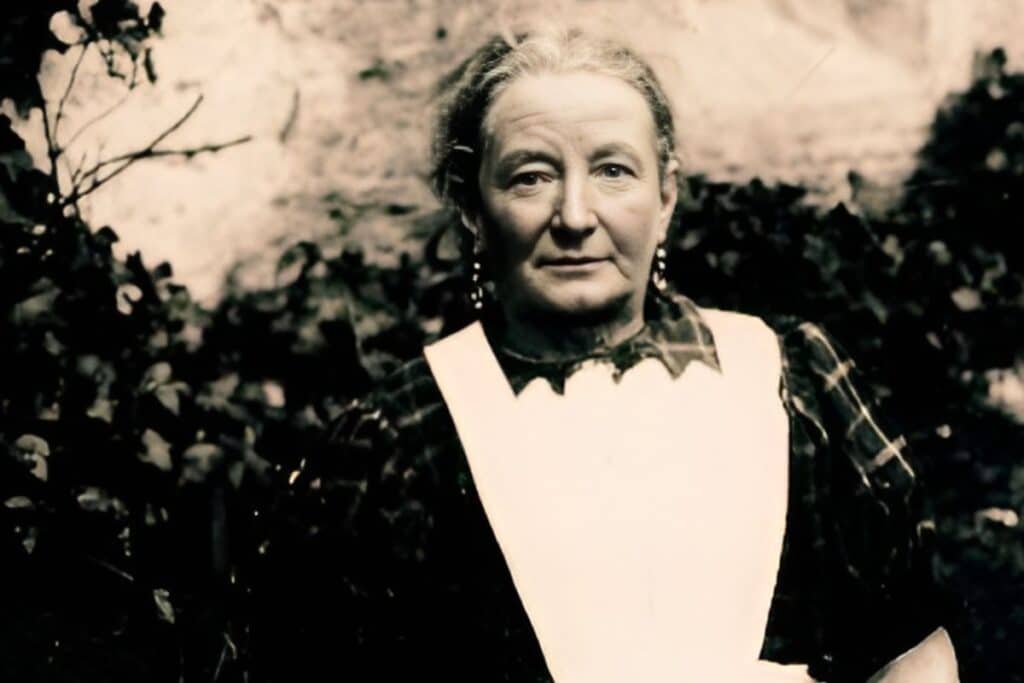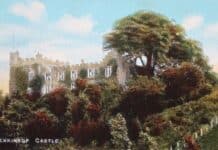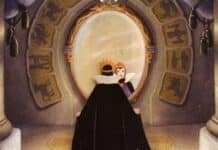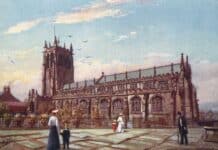Nell Racker was a Victorian midwife accused of witchcraft, whose journey mirrors the trials of Pendle Hill and Salem, leaving behind a legacy of pioneering holistic medicine amidst controversy and resilience, writes GEMMA JOHNSON

In researching my hometown of Rochdale, I have uncovered many fascinating tales of the paranormal, folklore and urban legend. I was scouring through the local studies archive when I uncovered a picture of a weather worn woman wearing a white apron, stood in front of a stone cottage with a well-established garden. Her greying hair pulled back from her face; she looked tired as though the challenges of life had worn her down.
This was Ellen Wallace, known to most as Nell Racker and she was the subject of folklore throughout the town. Labelled by many as a witch, she has quickly become one of my favourite women of Rochdale’s past.
Who was Nell Racker?
Nell was born in 1846, from an early age she wanted to care for people and so in adulthood she trained as a community midwife. Birth would take place within the home; hospital births weren’t the norm during the Victoria era. Nell took great pride in caring for women during their hour of need when they were at their most vulnerable.
She helped bring many babies successfully into the world. But Nell wanted more, she felt that there needed to be more opportunities for treatment that extended beyond the potentially barbaric medical interventions that were common practice for Victorian doctors.
With this at the forefront, Nell trained in herbal and spiritual healing. Nell would collect her materials from the natural environment around her, scaling the moors to find herbs and flowers that would form her ointments and preparations.
Initially, used to help women during labour, Nell expanded her service to offer treatment to the wider community. Word spread quickly about ‘Nell the Wisewoman’ with people travelling far and wide to access her treatments.
But just as much as Nell was regarded for her herbal treatments, she was subject to much controversy from the medical community who felt that she was undermining medical interventions. As she continued to expand and develop her practice, she began to include psychological healing which involved spiritualism.
Nell was providing an early example of holistic healing, focusing on the mind and the body but the element of spiritualism proved a potential step too far. Nell was not afraid of demonstrating her gift of clairvoyancy and began to include her Mother within her practice who was a skills spiritualist offering divination and healing through charms.
Witchcraft accusations
Witchcraft accusations began to echo around the town for surely it wasn’t possible for spiritualism to be practiced without an element of the occult. One of the accusations was that it wasn’t actually Nell Racker that was conducting the healing practice, she had channelled the devil through engagement with the occult and it was Lucifer himself who was healing in exchange for the souls of those who attended Nell’s clinics.
But Nell also looked like a witch – wild hair, small in stature and slightly stooped with potions and ointments being made over the fireplace. Kettles and pans hung from trees within the wild garden at the front of her cottage.
To her patients, Nell Racker was a godsend through her nurturing, person centred care. Always discrete and taking time to listen to their needs. But, within the outside medical communities, and religious groups who had now homed in on the controversy surrounding Nell. Great delight came when there was an opportunity to strike Nell off the midwifery register in 1917 following an accusation of negligence.
Nell’s story feeds into the narrative that surrounded the Pendle Hill witches of 1612 and the Salem witch trials of 1692, accusations made towards women who were breaking from the norms of religion. Women who had a voice and were using it or women who were viewed as different whether in physical appearance or mannerisms.
Rather than accept the differences, it was too easy to throw the ‘witch’ label around causing devastating consequences for the women and those around her. Whilst there was no threat of execution for Nell, she lost what she had worked so hard for – her career as a midwife and nurse.
But Nell can seek solace in that she is still spoken of today, she has shed the label of witch and is now fondly remembered as a pioneer of holistic medicine. Nell Racker died in 1933.
Tell us your thoughts about this article about Nell Racker in the comments section below!








1962?
You’re correct the Salem Witchtrials weren’t in 1962. Thanks for the pick up Daniel, we’ve fixed the typo!